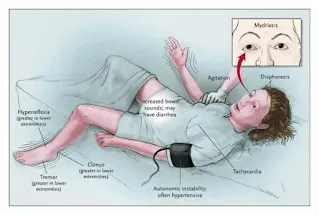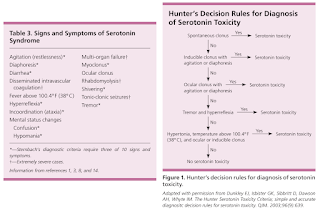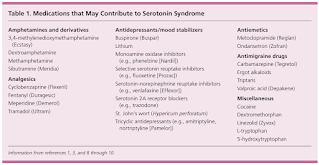Serotonin Syndrome
Introduction
Serotonin syndrome is a mild to potentially life-threatening condition caused by serotonin toxicity that typically develops within minutes to hours after serotonergic medication use, drug interaction or overdose.
Symptoms
The syndrome is characterised by symptoms including
- Confusion
- Disorientation
- Abnormal movements
- Exaggerated reflexes
- Fever
- Sweating
- Shivering
- Diarrhoea
- Hypotension or hypertension
The diagnosis should be based on the Hunter Serotonin Toxicity Criteria or Sternbach's criteria.
- Anticholinergic syndrome, malignant hyperthermia and neuroleptic malignant syndrome should be excluded.
Management
Removal of the precipitating drug usually results in quick resolution; however supportive symptomatic treatment may be necessary in hospital.
- IV hydration
- Providing oxygen
- Continuous cardiac monitoring
- Cooling)
Benzodiazepines is considered as first-line treatment to sedate patient, correct mild hypertension and tachycardia, reduce agitation, tremor, myoclonus, or muscle rigidity, and to reduce fever.
- If patient remains agitated after use of benzodiazepines and stabilization of vital signs, consider administration of 5HT-2A receptor antagonists, such as cyproheptadine and chlorpromazine.
Management options that should be avoided include
- Antipyretics - Temperature increase is due to muscular activity, not hypothalamus set-point.
- Propranolol - May cause hypotension and shock in patients with autonomic instability, and may mask tachycardia used to monitor response to therapy.
- Bromocriptine - Implicated in development of serotonin syndrome.
- Succinylcholine - Risk of hyperkalaemia and worsening of rhabdomyolysis.
- Prolonged use of physical restraints - May reinforce isometric muscle contraction associated with lactic acidosis and hyperthermia.
Prevention
Serotonin syndrome is best prevented by avoiding the use of combinations of several serotonergic drugs.
Special care is needed
- When changing from a selective serotonin reuptake inhibitor (SSRI) to an MAOI and vice versa.
- The SSRIs, particularly fluoxetine, have long half-lives, and serotonin syndrome may occur if a sufficient washout period is not allowed before switching from one to the other.
- Many recreational drugs such as amphetamines and cocaine have serotonin agonist activity.
- Tramadol may cause serotonin syndrome, particularly it is used at high doses.
- St John's wort can induce serotonin syndrome.
Also, sympathomimetic agents and tyramine containing foods are contraindicated in patients on MAOIs treatment, as it can cause high blood pressure and hypertensive crisis. Tyramine-rich foods include
- Aged chicken liver
- Aged cheese
- Beer on tap
- Meats that have been fermented or air-dried, such as summer sausage
- Red wine
- Sauerkraut
- Soy sauce
Other foods that may contain tyramine include
- Sauces containing fish or shrimp
- Miso soup
- Yeast extract



Comments
Post a Comment